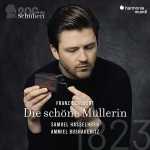

Composer: Franz Schubert
Performer: Benjamin Appl
Orchestra: Munich Radio Orchestra
Conductor: Oscar Jockel
Format: FLAC (tracks)
Label: BR Klassik
Catalogue: 900346
Release: 2023
Size: 1.27 GB
Recovery: +3%
Scan: yes
Lieder with Orchestra
01. Abendstern, D. 806
02. Rosamunde, D. 797: IIIb. Romanze. Der Vollmond strahlt auf Bergeshöh’n
03. 18 German Dances & Ecossaises, Op. 33, D. 783: No. 1, Tanz I – No. 2, Tanz II
04. Geheimes, Op. 14 No. 2, D. 719
05. Du bist die Ruh, Op. 59 No. 3, D. 776
06. Die schöne Müllerin, Op. 25, D. 795: No. 10, Tränenregen
07. 18 German Dances & Ecossaises, Op. 33, D. 783: No. 3, Tanz III – No. 4, Tanz IV – No. 5, Tanz V
08. Ganymed, Op. 19 No. 3, D. 544
09. Der Tod und das Mädchen, Op. 7 No. 3, D. 531
10. Gruppe aus dem Tartarus, Op. 24 No. 1, D. 583
11. Schwanengesang, D. 957: No. 9, Ihr Bild
12. Die Forelle, D. 550
13. 18 German Dances & Ecossaises, Op. 33, D. 783: No. 6, Tanz VI – No. 7, Tanz VII – No. 8, Tanz VII
14. Im Abendrot, D. 799
15. An die musik, Op. 88 No. 4, D. 547
16. An Sylvia, Op. 106 No. 4, D. 891
17. Winterreise, Op. 89, D. 911: No. 20, Der Wegweiser
18. Nacht und Träume, Op. 43 No. 2, D. 827
19. Schwanengesang, D. 957: No. 4, Ständchen
20. 18 German Dances & Ecossaises, Op. 33, D. 783: No. 9, Tanz IX – No. 10, Tanz X
21. Prometheus, D. 674
22. Am Tage Aller Seelen, D. 343
23. Erlkönig, Op. 1, D. 328
Time and again, composers – well-known and lesser-known – have arranged Franz Schubert’s piano songs for orchestra. These versions are not in any way intended to cast doubt upon the powerful quality of the originals, they merely place them in a different light, and/or attempt to make them easier to perform on a larger scale – when an art song cannot be performed in an intimate salon or chamber music hall, it can also make an impact in a large concert hall. Baritone Benjamin Appl has compiled nineteen such arrangements from the 19th and 20th centuries for this new CD from BR-KLASSIK. The Münchner Rundfunkorchester, conducted by Oscar Jockel, provides accompaniment that is subtle and in keeping with the work.
“To my ear, it is often quite insulting, in a giant hall and after an orchestral number, to have to listen to a singer performing lieder to a spindly piano accompaniment!” Max Reger scolded, and he went on to take appropriate action by orchestrating several piano songs, including thirteen by Schubert. Many famous composers were not above taking on the role of arranger. Indeed, they even saw an artistic challenge in “staging” the Lied in a new and colourful way using the possibilities of the orchestra – and without altering the musical substance in the process.
The versions of Schubert’s “An die Musik”, “Im Abendrot”, “Nacht und Träume”, “Prometheus” and “Erlkönig” recorded here are by Max Reger; Anton Webern created those for “Du bist die Ruh”, “Tränenregen” and “Der Wegweiser”; Johannes Brahms arranged “Geheimes”, Jacques Offenbach the “Ständchen”, and Benjamin Britten “Die Forelle”. Further arrangements are by conductor Felix Mottl (“Der Tod und das Mädchen”), lied accompanist Alexander Schmalcz (“Abendstern”, “An Silvia”) and composer Kurt Gillmann (“Ganymed”). The album is rounded off by the first recording of Johann von Herbeck’s orchestrations of Schubert’s dances, thus establishing a connection between folk music and Schubert’s art songs.
One might react to this album with initial annoyance and ask whether it is really necessary to hear orchestrated versions of Schubert’s supremely pianistic songs. It may come as a surprise, then, to find that most of these Lieder with Orchestra were arranged by great composers. They include Benjamin Britten, Jacques Offenbach, and Max Reger, who took on the job because, he said, he hated to hear a piano-accompanied song on an orchestral program. Perhaps the most surprising name to find is that of Anton Webern, but his arrangements are not the minimal, pointillistic things one might expect; he wrote these arrangements as a way of studying Schubert’s music, and they are quite straightforward. Indeed, it is somewhat difficult to distinguish the arrangers simply by listening to the music; Schubert’s melodic lines tend to suggest distinctive solutions. Perhaps Reger’s are a bit more lush than the others, although his version of Erlkönig, D. 328, is one of the few numbers here that just doesn’t work (there is no way to replicate the percussive quality of the accompaniment). As for the performances as such, Benjamin Appl is clearly an important rising baritone, and he has a wonderful natural quality in Schubert. An oddball release like this might seem an unusual choice for a singer in early career, but he contributes his own notes, and he seems to have undertaken the project out of genuine enthusiasm for the material. At the very least, he has brought some intriguing pieces out of the archives and given them highly listenable performances. The Munich Radio Orchestra, under the young Oscar Jockel, is suitably restrained and keeps out of Appl’s way. This release made classical best-seller lists in the autumn of 2023.



